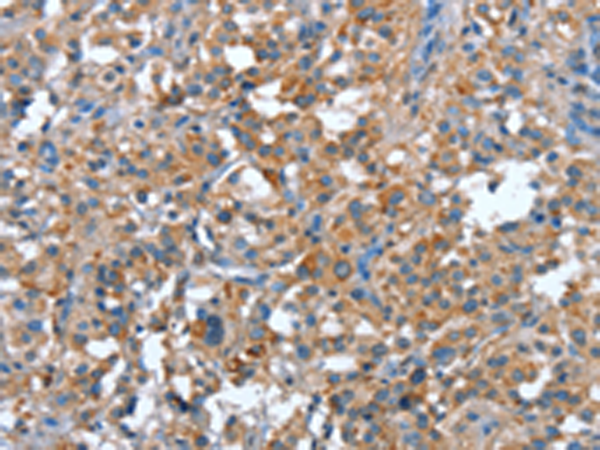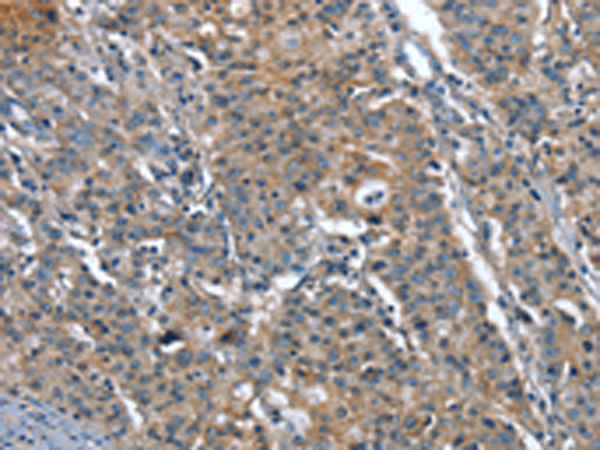

| WB | 咨询技术 | Human,Mouse,Rat |
| IF | 咨询技术 | Human,Mouse,Rat |
| IHC | 1/15-1/50 | Human,Mouse,Rat |
| ICC | 技术咨询 | Human,Mouse,Rat |
| FCM | 咨询技术 | Human,Mouse,Rat |
| Elisa | 1/2000-1/5000 | Human,Mouse,Rat |
| Aliases | GVI; PLA2; INAD1; NBIA2; iPLA2; NBIA2A; NBIA2B; PARK14; PNPLA9; CaI-PLA2; IPLA2-VIA; iPLA2beta |
| Host/Isotype | Rabbit IgG |
| Antibody Type | Primary antibody |
| Storage | Store at 4°C short term. Aliquot and store at -20°C long term. Avoid freeze/thaw cycles. |
| Species Reactivity | Human, Mouse, Rat |
| Immunogen | Synthetic peptide of human PLA2G6 |
| Formulation | Purified antibody in PBS with 0.05% sodium azide and 50% glycerol. |
+ +
以下是3篇涉及PLA2G6抗体的参考文献及其摘要概括:
1. **文献名称**:*PLA2G6 mutations cause iron accumulation disorders of infancy*
**作者**:Morgan NV, et al.
**摘要**:该研究利用PLA2G6抗体进行蛋白质印迹分析,发现突变导致PLA2G6酶活性丧失,与婴儿期脑铁沉积症(NBIA)相关,揭示了PLA2G6在铁代谢中的关键作用。
2. **文献名称**:*Neurodegeneration associated with genetic defects in phospholipase A2*
**作者**:Gregory A, et al.
**摘要**:通过免疫组化及抗体标记,发现PLA2G6基因缺陷导致神经元磷脂代谢异常,与帕金森病和肌张力障碍相关,强调了该蛋白在神经退行性病变中的功能。
3. **文献名称**:*Loss of PLA2G6 leads to altered mitochondrial dynamics in dopaminergic neurons*
**作者**:Sumi-Akamaru H, et al.
**摘要**:研究利用PLA2G6抗体检测多巴胺能神经元中蛋白表达,发现其缺失引发线粒体分裂-融合失衡,为PLA2G6相关神经退行机制提供了实验依据。
提示:如需具体文献编号或实验细节,建议在PubMed或Web of Science中以“PLA2G6 antibody”及“neurodegeneration”为关键词进一步筛选。
**Background of PLA2G6 Antibodies**
PLA2G6 (Phospholipase A2 Group VI) encodes a calcium-independent phospholipase A2 enzyme, iPLA2β, which plays a critical role in lipid metabolism and membrane homeostasis. This enzyme catalyzes the hydrolysis of glycerophospholipids to release free fatty acids, such as arachidonic acid, and lysophospholipids, contributing to inflammatory signaling, membrane repair, and cell death regulation. PLA2G6 is highly expressed in the brain, particularly in neurons, where it maintains mitochondrial integrity and regulates lipid second messengers.
Mutations in *PLA2G6* are linked to neurodegenerative disorders, including infantile neuroaxonal dystrophy (INAD), Parkinson’s disease (PD), and dystonia-parkinsonism. These genetic alterations disrupt enzyme activity, leading to abnormal lipid accumulation, mitochondrial dysfunction, and oxidative stress, which are hallmarks of disease pathology.
PLA2G6 antibodies are essential tools for studying these mechanisms. They enable the detection and quantification of PLA2G6 protein expression in tissues or cell models, aiding in research on disease biomarkers, enzymatic activity assays, and cellular localization. Specific antibodies targeting distinct domains (e.g., catalytic or ankyrin-repeat regions) help elucidate functional changes caused by mutations. Additionally, they support diagnostic applications, such as immunohistochemical analysis of brain samples from affected individuals. As PLA2G6-related pathways gain attention in neurodegeneration and lipid biology, these antibodies remain vital for advancing both basic research and therapeutic development.
×